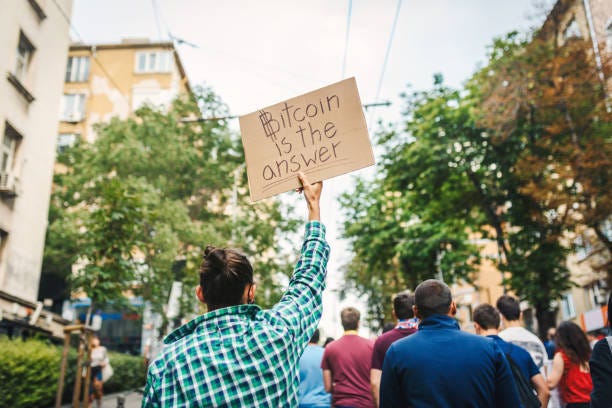HODL Up—Did Crypto Just Fund a War?
From fleeing civilians to militant funding, crypto is making an impact (for better or worse).
Discussions about cryptocurrencies often revolve around two things: their ability to skyrocket overnight, making lucky investors filthy rich, and their equally infamous ability to nosedive into oblivion faster than you can say “HODL.” Somewhere in this chaos, we tend to overlook a fundamental truth: crypto is more than just a speculative rollercoaster; it’s an alternative financial system. And as with any powerful tool, its impact depends on whose hands are wielding it.
So, does crypto fund war? Yes. Does it also help people escape from war? Also yes. Welcome to the wild, morally ambiguous world of digital finance.
Crypto: The Unexpected Lifeboat in Conflict Zones
When war breaks out, access to traditional banking systems often becomes a distant dream. Blocked accounts, collapsed banking institutions, and hyperinflation turn everyday transactions into nightmares. Enter crypto: borderless, censorship-resistant, and fast.
Take Andrey, for example, a Russian software developer who fled St. Petersburg for Georgia when the war in Ukraine began. Once a crypto skeptic, he quickly converted his money into USDC, a stablecoin pegged to the U.S. dollar, after realizing that moving fiat cash was nearly impossible. Thanks to crypto, Andrey and his wife could restart their lives in a new country without financial shackles.
Or consider Fadey, a 20-year-old Ukrainian, who paid for his bus ride out of Ukraine with bitcoin and used his crypto savings to survive in Poland. He didn’t have to smuggle wads of cash across borders or risk financial institutions freezing his funds. Instead, his money was stored safely on a USB stick, immune to political and economic instability.
The same story echoes in Sudan, where expatriate SudanHodl used bitcoin to fund his parents’ escape from war. He later launched BTC Sudan to help others flee, proving that sometimes, the fastest way out of danger isn’t through a bank—it’s through the blockchain.
Even in Afghanistan, where financial restrictions under the Taliban have crippled the economy, crypto has become a lifeline. Blockchain analytics firm Chainalysis once ranked Afghanistan among the top 20 nations for crypto adoption, largely because it provided a way for people to secure their assets against political upheaval and inflation.
When Crypto Becomes the Megaphone of Resistance
Beyond its role in financial survival, crypto has also become the backbone of protests against oppressive regimes. Governments can shut down bank accounts, censor transactions, and freeze assets, but they can’t unplug the blockchain.
During the 2020 #EndSARS protests in Nigeria against police brutality, activists found their traditional bank transactions mysteriously “slowed down.” Undeterred, they turned to bitcoin, raising over $150,000 to sustain the movement. Even Jack Dorsey, Twitter’s co-founder and a bitcoin advocate, chipped in his support.
In Belarus, where dictator Alexander Lukashenko cracked down on dissent, the Belarus Solidarity Foundation (BYSOL) raised over $2 million in bitcoin donations within a month. This money directly supported dissidents, helped bypass government surveillance, and kept the resistance alive
.
If there’s one thing authoritarian regimes hate more than dissent, it’s decentralized finance funding that dissent.
The Flip Side: Crypto’s Darker Affiliations
But here’s the catch: just as crypto can empower the oppressed, it can also fuel the very forces they’re fighting against.
Terrorist groups have realized that the same characteristics making crypto appealing to protesters—pseudonymity, global accessibility, and reduced regulatory oversight—also make it useful for funding illicit activities. In October 2023, following a Hamas attack in Israel, scrutiny over crypto’s role in terrorist financing intensified. Israel has since seized multiple crypto accounts linked to the group, while U.S. lawmakers have called for stricter regulations.
And while blockchain transactions are publicly recorded, bad actors aren’t exactly leaving their wallet addresses in their Twitter bios. Many use crypto mixers—essentially digital laundering services—to obscure the origin and destination of their funds, making tracking them significantly harder.
But How Big Is the Problem?
Despite sensational headlines, terrorist financing through crypto remains a fraction of overall illicit finance. According to the United Nations, around 5% of terrorist attacks were funded via crypto a few years ago, with some estimates suggesting this number could rise to 20%. Still, traditional methods—cash, shell companies, and informal banking networks—continue to dominate terrorist financing.
Chainalysis, a blockchain analytics firm, reports that illicit transactions (including scams, ransomware, and theft) make up less than 1% of the entire crypto market. While that’s still billions of dollars, it’s a drop in the ocean compared to global illicit finance through traditional banking channels.
So, What’s the Verdict?
Well, there isn’t one. Crypto is neither an angel nor a demon—it’s a mirror reflecting the intentions of those who use it. It has saved lives, enabled protests, and provided financial freedom where traditional systems failed. But it has also funded militant groups, enabled cybercrime, and complicated global law enforcement efforts.
At its core, crypto is just money in a digital form. And as we’ve seen throughout history, money has never been inherently good or evil. It’s simply a tool. Whether that tool builds bridges or burns them down depends entirely on the hands holding it.
So, the next time someone tells you that crypto is just for get-rich-quick schemes and Ponzi coins, remind them that it’s also for war refugees, dissidents, and, unfortunately, criminals. It’s not black or white—it’s a shade of blockchain gray.
If you're not a terrorist, a warlord, or a central banker trying to stay relevant, then you should totally subscribe to The Money Mindset and share this with your friends. Otherwise, we might have to start accepting bribes in Dogecoin.





